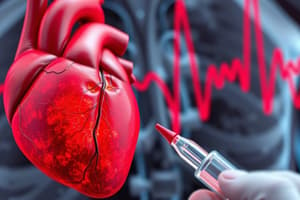Podcast
Questions and Answers
What is the primary goal of biomarker tests in precision medicine?
What is the primary goal of biomarker tests in precision medicine?
- To provide a one-size-fits-all treatment approach
- To enable selection of the most beneficial treatment based on individual disease characteristics (correct)
- To increase the cost of treatment options
- To replace clinicians in treatment decision-making
How do biomarker tests benefit preventive or therapeutic interventions?
How do biomarker tests benefit preventive or therapeutic interventions?
- They allow concentration on those who are most likely to benefit from specific treatments (correct)
- They help identify patients who are less likely to benefit
- They eliminate the need for clinical trials
- They provide a universal treatment protocol for all patients
What role does oncology play in the advancement of precision medicine?
What role does oncology play in the advancement of precision medicine?
- It refuses to adopt new testing methodologies
- It is primarily focused on surgical interventions
- It has been at the forefront due to the genomic nature of cancer (correct)
- It emphasizes a non-genomic approach to treatment
What has research shown about the mechanisms of action of targeted therapies?
What has research shown about the mechanisms of action of targeted therapies?
What is a potential use of advanced biomarker tests beyond FDA-approved uses?
What is a potential use of advanced biomarker tests beyond FDA-approved uses?
What is a surrogate endpoint in the context of clinical trials?
What is a surrogate endpoint in the context of clinical trials?
What is the significance of the BRAF V600E mutation in cancer treatment?
What is the significance of the BRAF V600E mutation in cancer treatment?
What is one of the ultimate goals of precision medicine?
What is one of the ultimate goals of precision medicine?
What is the primary function of high-sensitivity troponin (hs-Tn) assays?
What is the primary function of high-sensitivity troponin (hs-Tn) assays?
Which biomarker has been linked to increased risks of heart failure, cardiovascular events, and mortality?
Which biomarker has been linked to increased risks of heart failure, cardiovascular events, and mortality?
What is the role of B-type natriuretic peptide (BNP) and N-terminal pro-B-type natriuretic peptide (NT-proBNP) in cardiac health?
What is the role of B-type natriuretic peptide (BNP) and N-terminal pro-B-type natriuretic peptide (NT-proBNP) in cardiac health?
Which biomarker is also known as soluble ST2?
Which biomarker is also known as soluble ST2?
What does the study by McKie et al. reveal about NT-proBNP levels?
What does the study by McKie et al. reveal about NT-proBNP levels?
Which of the following biomarkers is primarily associated with inflammation and oxidative stress?
Which of the following biomarkers is primarily associated with inflammation and oxidative stress?
What was a significant outcome of using high-sensitivity troponin assays in myocardial infarction diagnosis?
What was a significant outcome of using high-sensitivity troponin assays in myocardial infarction diagnosis?
In the context of cardiac disease, what does the term 'prognostic marker' refer to?
In the context of cardiac disease, what does the term 'prognostic marker' refer to?
Which biomarker shows promise in predicting post-infarction remodeling?
Which biomarker shows promise in predicting post-infarction remodeling?
How can high-sensitivity troponin (hs-Tn) assays influence patient outcomes?
How can high-sensitivity troponin (hs-Tn) assays influence patient outcomes?
Study Notes
Biomarker Tests and Precision Medicine
- Biomarker tests guide therapy selection by analyzing individual molecular profiles, enhancing patient treatment outcomes.
- Precision medicine personalizes medical care based on unique patient characteristics, optimizing prevention and treatment efficacy.
- Oncology benefits significantly from precision medicine due to complex cancer genetics involving numerous oncogenes and tumor suppressors.
- Clinical evidence is continuously evolving; treatments initially targeting one biomarker variant may be effective for various molecular targets.
- Advanced biomarker tests allow for more precise disease characterization, including off-label drug use to expand therapeutic options.
- Biomarker tests serve as surrogate endpoints in clinical trials, expediting patient identification for targeted therapies.
- Vemurafenib development exemplifies rapid approval processes, achieving clinical use for BRAF V600E mutation in under six years.
Novel Biomarkers in Cardiac Disease
- High-sensitivity troponin (hs-Tn) enables detection of minor heart muscle damage, outperforming traditional assays in myocardial infarction diagnosis.
- Studies indicate hs-Tn assays improve early myocardial infarction diagnosis and provide prognostic information for coronary artery disease patients.
- Galectin-3 is linked to adverse cardiovascular outcomes; elevated levels correlate with increased heart failure risk and mortality.
- ST2, or soluble ST2, serves as a biomarker tied to inflammation and cardiac remodeling; predicts post-infarction outcomes and prognosis.
- B-type natriuretic peptide (BNP) and N-terminal pro-B-type natriuretic peptide (NT-proBNP) signal increased ventricular stress, assisting in risk stratification for cardiovascular events, even in healthy individuals.
- Growth differentiation factor 15 is involved in inflammation and cellular stress responses, highlighting its potential role in heart disease monitoring.
Studying That Suits You
Use AI to generate personalized quizzes and flashcards to suit your learning preferences.
Description
Explore the crucial role of biomarker tests in precision medicine and how they guide therapy selection. This quiz delves into individual molecular profiling, its impact on treatment outcomes, and applications in oncology, including advanced testing and clinical trial relevance.




